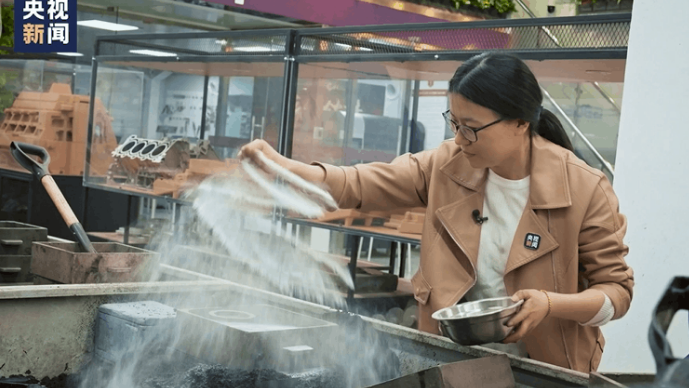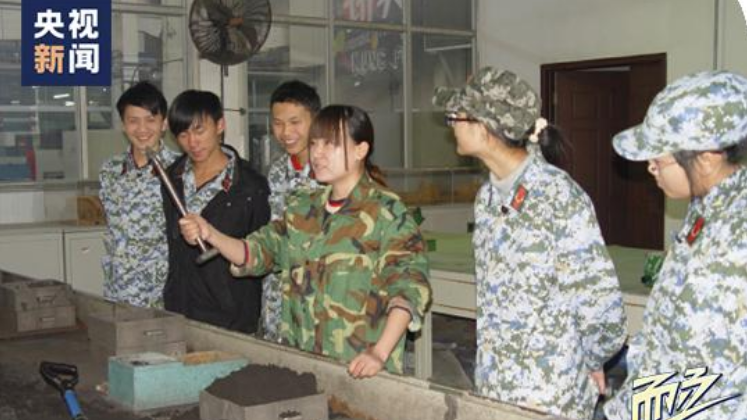
Xing Xiaoying, a higher vocational graduate-turned-teacher at Tsinghua University, in a video which garnered millions of positive comments online. /CMG
Xing Xiaoying, a higher vocational graduate-turned-teacher at Tsinghua University, in a video which garnered millions of positive comments online. /CMG
"Many people may find it unimaginable that a vocational school graduate could give lectures to students at a top Chinese university," said Xing Xiaoying, a higher vocational graduate-turned-teacher at Tsinghua University, in response to viral videos of her lectures.
One of the videos – where she taught students how to cast molds – has garnered millions of positive comments online.
"It was the vocational education that gave me the opportunity to excel in life," said Xing, adding that in three years at vocational college, more than half of the courses were on practical skills. "That's why I am able to teach those skills to undergraduate students at Tsinghua."
Born in 1994, Xing went to Shaanxi Polytechnic Institute, a vocational college in a city near Xi'an, in 2011. Due to her excellent performance in her major, she was recommended to be an intern teacher at Tsinghua's Fundamental Industry Training Center in November 2013.
Working at Tsinghua, China's best university for science and technology, is a dream job for many teachers. The university typically requires candidates to have a PhD background and preferably to have graduated from prestigious universities, or to have taught at reputed higher-education institutions.
Xing still remembers how nervous she was when she first had to face Tsinghua undergraduates, who were about the same age as her. "What should I do if I can't answer their questions?" That's the question she asked herself back then.

Xing still remembers how nervous she was when she first had to face Tsinghua undergraduates, who were about the same age as her. /CMG
Xing still remembers how nervous she was when she first had to face Tsinghua undergraduates, who were about the same age as her. /CMG
"I really had lots of pressure at that time," Xing said, remembering that she used to cry in the workshop when she did not know how to teach students practical skills, but kept on practicing after weeping for a while.
"It was usually very late when I completed practicing the lecturing," Xing said, adding that she constantly questioned her competency for the job.
Fortunately, Xing did not give up. She devoted more time and energy to preparing lectures. During leisure time, she went to learn how experienced teachers instructed students. And after work, she practiced lecturing at empty workshops, where she imagined tools as students and interacted with them.
It paid off. Xing's first independent lecture at Tsinghua won positive feedback from the students. After the internship period, Xing was officially appointed as a practice instructor by Tsinghua.
More than nine years have now passed, and Xing has taught around 30,000 students. During the period, Xing also sought to continuously improve herself. She received a bachelor's degree, applied for patents in her professional field and was awarded the title of engineer.
In the first class of each new semester, Xing frankly tells the students she used to be a higher vocational student. "I don't care how I'm labelled. I know my own path, no matter the starting point is high or low, hard work always brings hope."
In her class, she encourages students to take their time and find their interests and direction through practice.
"Xing Xiaoying's personal journey is typical of many vocational school graduates," Xing Hui, director of the Vocational Education Research Center at National Academy of Education Administration, said in May last year at a press conference summarizing the overall picture of vocational education.
Over the past decade, vocational education has improved significantly, Xing noted. The employment rate, which includes further education, for secondary vocational education has consistently remained above 96 percent, and for higher vocational education, it has surpassed 91 percent, exceeding the average of conventional universities.
The societal impact of vocational colleges has also witnessed substantial enhancement, she said. In sectors such as modern manufacturing, emerging industries and services, over 70 percent of newly hired personnel are graduates of vocational colleges.